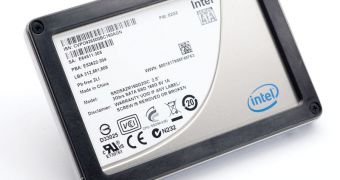Intel has just released a new firmware for its X18-M, X25-M and X25-V solid state drives with 34nm NAND flash, the new update promising to resolve various issues that users encountered, like slow boot issues and drive hangs caused by S.M.A.R.T. self tests.
The new firmware is called 02M3, its full revision number is 2CV102M3, and fixes problems regarding slow boot times, when the SSDs were run on SATA 6Gb/s controllers, as well as some possible drive hangs that occurred when reading S.M.A.R.T. self-test log.
In addition to these bug fixes, Intel has also brought a series of improvements to the drives, including more accurate reporting of drive health thanks to revised S.M.A.R.T. attributes, as well as better NCQ capabilities.
This new firmware is available only for X18-M, X25-M and X25-V SSDs that are built using 34nm NAND flash, as older Intel X18-M and X25-M SSDs (G1 - first generation) with 50nm NAND drives will still have to rely on the 8820 firmware.
Enterprise class X25-E SSDs also aren't compatible with this latest update (newest firmware version is 8850).
Users that decide the install the latest version of the firmware on their SSDs can download the Intel SATA SSD Firmware Update Tool v1.7 from here.
The tool then needs to be burn onto a CD-R or CD-RW as it is designed to run straight from the CD and not from Windows.
Users also have to make sure that the BIOS SATA ports are configured in Legacy/Compatibility mode or AHCI mode, otherwise the tool won't function properly.
After booting from the CD, a few simple steps will have to be accomplished for the upgrade process to be successful.
A more detailed guide about upgrading the firmware of Intel SSDs can be downloaded right from the company's website, by following this link.

 14 DAY TRIAL //
14 DAY TRIAL //